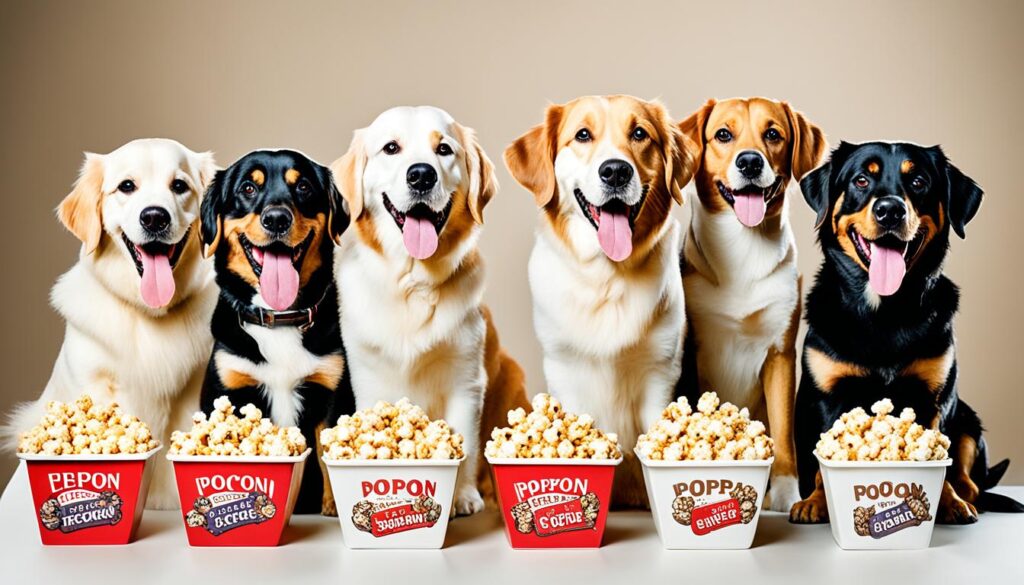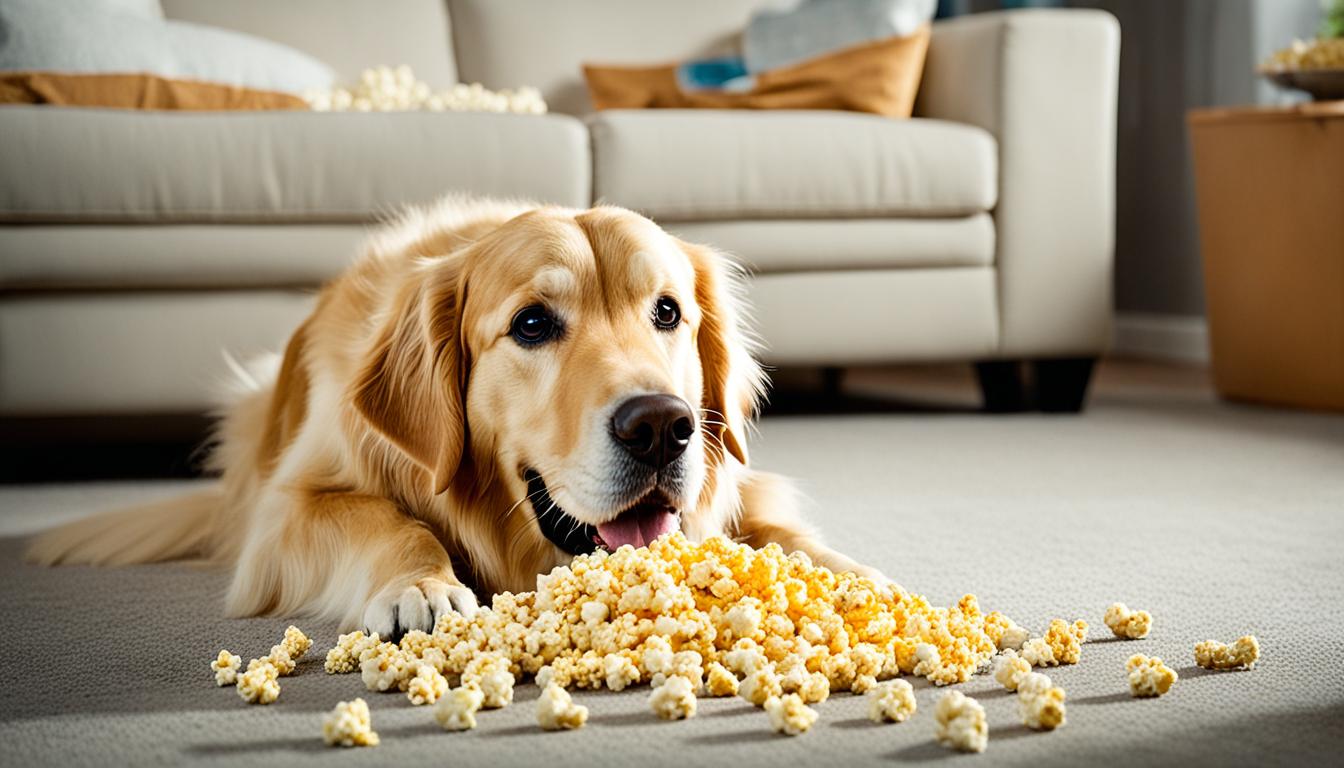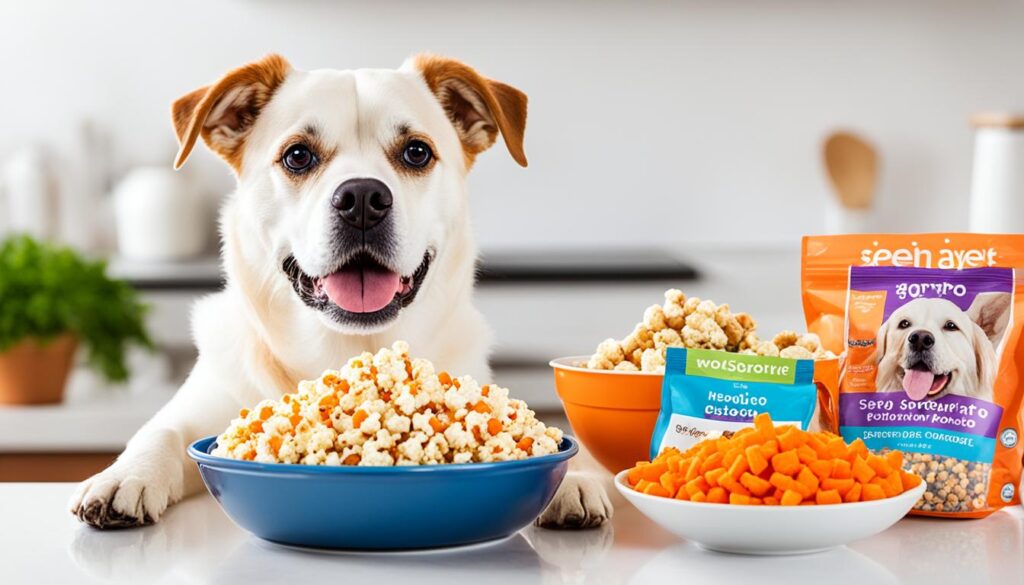As an Amazon Associate I earn from qualifying purchases.
Picture this: it’s movie night, and you’re curled up on the couch with your furry best friend by your side. The aroma of freshly popped popcorn fills the air, and you can’t help but indulge in this classic movie snack. As you reach for another handful, your dog gazes up at you with those big, pleading eyes, hoping for a taste. But before you toss them a piece, you pause and wonder, can dogs have popcorn? Is it safe for them to enjoy this crunchy treat? Let’s dig in and find out.
Key Takeaways:
- Plain, air-popped popcorn is safe for dogs in moderation.
- Avoid toppings like butter and salt, as they can cause digestive issues and weight gain.
- Unpopped or partially popped kernels pose a choking hazard and should be avoided.
- Popcorn alternatives, such as sliced fruits and vegetables, are healthier options for dogs.
- When in doubt, consult with your veterinarian to ensure your dog’s dietary needs are met.
The Safety of Popcorn for Dogs
While dogs have a knack for gobbling up anything that falls on the floor, not everything is safe for their consumption. When it comes to popcorn, it’s crucial to consider the potential dangers before sharing this beloved snack with your furry friend.
Plain, air-popped popcorn is generally safe for dogs to eat in small quantities. However, it’s important to steer clear of popcorn with butter, salt, and other tempting toppings. These additions might make the popcorn enticing to our taste buds, but they can cause havoc on a dog’s delicate digestive system.
But why are these toppings problematic for our canine companions? The answer lies in their adverse effects on a dog’s health. While a few pieces of buttered popcorn may not seem harmful, the high fat content can lead to stomach issues and unnecessary weight gain in dogs. Additionally, the salt in salted popcorn can cause dehydration and may contribute to the development of obesity.
Moreover, care should be taken to prevent dogs from consuming unpopped or partially popped kernels. These tiny morsels may pose choking hazards and can get stuck between a dog’s teeth, causing discomfort and potential dental issues.
Ultimately, to ensure the safety of your four-legged friend and prevent any unwanted incidents, it’s best to stick with plain, air-popped popcorn when treating your dog.
The Dangers of Feeding Popcorn to Dogs
As with any food, it’s important to be aware of the potential risks associated with feeding popcorn to dogs. To summarize the dangers:
- The high fat content in popcorn with butter can lead to stomach issues and weight gain.
- The salt in salted popcorn can cause dehydration and contribute to obesity.
- Unpopped or partially popped kernels can pose choking hazards and get stuck between a dog’s teeth.
By avoiding these pitfalls, you can enjoy sharing a few pieces of plain, air-popped popcorn with your furry friend guilt-free.
Popcorn and Dogs’ Health
While popcorn itself does contain some minerals and fiber that can benefit dogs, it’s essential to consider the overall impact on their health. The high fat, salt, and sodium content in buttered and seasoned popcorn can lead to various health issues in dogs, such as stomach upset, dehydration, and obesity. Feeding dogs a complete and balanced diet of high-quality dog food is crucial to meet their nutritional needs.
Remember, moderation is key when it comes to treating your furry friend with popcorn.
Let’s break it down:
The high fat content in buttered popcorn can contribute to weight gain and obesity in dogs. Just like humans, dogs should maintain a healthy weight to prevent various health problems.
Excessive salt and sodium can cause dehydration and lead to electrolyte imbalances in dogs. It’s important to monitor their sodium intake and provide fresh water regularly.
Why a Balanced Diet Matters
Your dog’s regular diet typically provides the necessary minerals and fiber for their optimal health. While popcorn may seem like a fun treat, it should not substitute a well-rounded dog food diet. Quality dog food brands are formulated with ingredients that fulfill your dog’s specific nutritional requirements to support their overall well-being.
Here’s a comparison table between popcorn and a balanced dog food diet:
| Aspect | Popcorn | High-Quality Dog Food |
|---|---|---|
| Fiber | Contains | Adequate amount |
| Minerals | Contains some | Complete and balanced |
| Fat | High in buttered popcorn | Controlled levels |
| Salt | High in seasoned popcorn | Controlled levels |
As you can see, a high-quality dog food diet provides a more comprehensive and controlled balance of essential nutrients. It’s best to consult with your veterinarian to choose the right dog food brand that meets your dog’s specific needs.
Next, let’s explore some popcorn alternatives that are safe and healthy for your furry companion.
Moderation and Guidelines for Feeding Popcorn to Dogs
Now that you know popcorn can be a delicious and safe treat for your furry friend, it’s important to understand the key principles of moderation and guidelines for feeding popcorn to dogs. While it’s a tasty snack, too much popcorn can lead to health issues, so let’s dive into some important tips.
Limit Treats to Less Than 10% of Daily Caloric Intake
When it comes to treating your dog with popcorn, moderation is key. Treats, including popcorn, should make up less than 10% of your dog’s daily caloric intake. This ensures that your dog receives a balanced diet and avoids consuming excessive amounts of calories.
Stick to Plain, Air-Popped Popcorn
When feeding popcorn to your furry friend, always opt for plain and air-popped popcorn. Avoid any added toppings like butter or salt, as these can be detrimental to your dog’s health. Plain popcorn is not only safer but also allows your dog to enjoy the natural flavors without any harmful additives.
Avoid Partially Popped Kernels
It’s important to be vigilant and avoid giving your dog partially popped kernels. These can pose a choking hazard or get stuck between their teeth, causing discomfort. Stick to fully popped kernels to ensure a safe snacking experience for your furry companion.
Remember, popcorn should always be given to dogs in moderation as a treat or snack. Following these guidelines will help you ensure your dog’s safety and well-being when enjoying this delightful snack together.

“Popcorn: the perfect snack for dogs when enjoyed in moderation and prepared the right way.” – Dr. Olivia Barker, Veterinarian
Popcorn Alternatives for Dogs
If you’re concerned about the safety of popcorn for your dog or simply looking for alternative snacks to share, fret not! There are plenty of delicious and healthier options that will keep your furry friend happy and satisfied. Here are some popcorn alternatives that are both safe and enjoyable for dogs:
- Sliced Fruits: Treat your dog to the natural sweetness and crunch of sliced fruits like apples and carrots. These nutritious options are packed with vitamins and minerals that contribute to your dog’s overall well-being.
- Sliced Vegetables: Cucumbers are a great hydrating snack for dogs, especially during hot summer days. They provide a refreshing crunch without adding unnecessary calories or fat to your dog’s diet.
- Small Cooked Meats: Instead of popcorn, consider sharing small pieces of cooked chicken or lean meat with your dog. Not only will they relish the taste, but these protein-packed treats will also help support their muscle development.
H3: Fun Fact
Did you know that dogs have about 1,700 taste buds compared to humans who have around 10,000? That’s why their preferences may differ from ours. So, it’s essential to give them snacks that are tailored to their needs and preferences!
With these popcorn alternatives, you can indulge your four-legged companion without worrying about any potential risks or health issues associated with popcorn. Remember to offer these snacks in moderation, alongside a balanced diet, to ensure your dog’s overall nutritional needs are met.
Conclusion
In conclusion, when it comes to dogs and popcorn, moderation and caution are key. Plain, air-popped popcorn can indeed be a safe and enjoyable treat for your furry friend. However, it’s crucial to avoid using toppings such as butter and salt, as they can cause digestive issues and contribute to weight gain in dogs.
Furthermore, it’s essential to be mindful of the potential choking hazards posed by whole or partially popped kernels. Always remember to prioritize your dog’s safety and well-being by providing them with appropriate popcorn pieces that are free from any potential risks.
If you have any concerns about the impact of popcorn or other human foods on your dog’s digestion, it’s always best to consult with a trusted veterinarian. They can offer personalized guidance based on your dog’s specific needs and help you make informed decisions about their diet and treat options.
While popcorn can be a fun snack to share with your pup on occasion, it’s important to explore alternative snacks that are not only safe but also offer nutritional benefits. Consider incorporating sliced fruits and vegetables like apples, carrots, and cucumbers into your dog’s snack repertoire. Additionally, small portions of cooked chicken or lean meat can provide your dog with protein without the potential risks associated with popcorn.
FAQ
Can dogs have popcorn?
What are the dangers of feeding popcorn to dogs?
Is popcorn safe for dogs?
How does popcorn affect dogs’ health?
How much popcorn can dogs eat?
What are some popcorn alternatives for dogs?
How can popcorn be safely fed to dogs?
Source Links
- https://www.akc.org/expert-advice/nutrition/can-dogs-eat-popcorn/
- https://www.purina.co.uk/articles/dogs/feeding/what-dogs-eat/can-dogs-eat-popcorn
- https://www.southernliving.com/culture/pets/can-dogs-eat-popcorn
As an Amazon Associate I earn from qualifying purchases.


